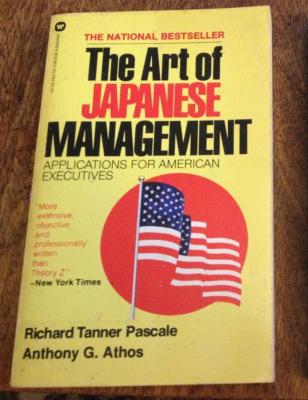 The Art of Japanese Management by Richard T. Pascale, Anthony G. Athos
The Art of Japanese Management by Richard T. Pascale, Anthony G. Athos

The Art of Japanese Management
by Richard T. Pascale, Anthony G. Athos
Original Price: ¥700 Discount: 14%
BUSINESS: PAPERBACK: (中古) used - acceptable, some parts highlighted
ENGLISH
After WWII, Japan borrowed and then adapted U.S. business methods. Today, in industry after industry, the Japanese have become, or are rapidly becoming, more productive than the United States. The authors of this provocative book assert that the biggest part of that "something" is managerial and they explore the tools available to our managers for closing the gap between Japan and America. this groundbreaking book tells us that the management techniques that hve madeJapanese business so highly productive are not culturally bound, but are in fact already shred by some of the most innovative and successful American companies.
The Art of Japanese Management goes beyond a discussion of the attributes generally assigned to Japanese success to point out our own managerial blind spots and their implications to managers, and I identify the universal attributes of excellent companies. The authors take an in-depth look at the Matsushita Electric Company (Panasonic, Quasar, etc.), which has succeeded through the use of many managerial tools common in the West - strategy, organizational structure, systems, financial controls, divisional performance reviews - in maintaining an entrepreneurial spirit in the company which allows divisional managers to be fairly independent, while at the same time preserving the ability of the central office management to exert substantial leadership, as epitomized by ITT under Harold Geneen, now passé, and by Edward Carlson's leadership of United Airlines, which incorporated many of Japan's methods of management. The authors examine the subtleties of Japanese management - the use of ambiguity and implicit communication instead of forced directness; the emphasis on coordinated interdependence and human relationships instead of competitive individualism, on intuition as much as on impersonal rationality. And they show how these differences can be bridged to create a managerial system that has the strengths of both cultures.
BUSINESS NONFICTION ECONOMICS VINTAGE MANAGEMENT LEADERSHIP CULTURAL ECONOMICS
We have this title in stock at our house in Chitose Hokkaido and can ship it directly to you now.
♥ 10 LIKES
BOOK COVER: The cover is taken from google book search unless otherwise noted.
DISCOUNT: 14% OFF
 SHARING IS CARING
SHARING IS CARING